Europeans Boycott Academic Ties With Iran: Official
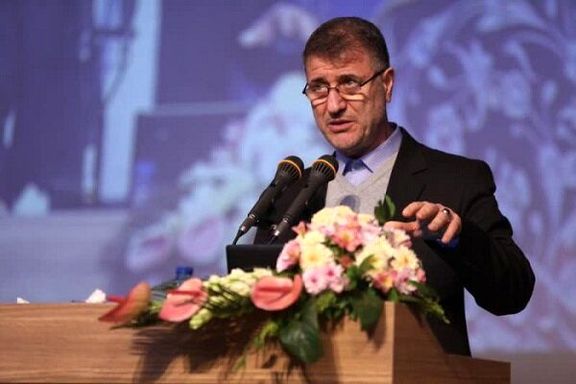
A high-ranking official of Iran's Ministry of Science says Europeans have restricted their academic ties with the Islamic Republic.

A high-ranking official of Iran's Ministry of Science says Europeans have restricted their academic ties with the Islamic Republic.
Germany has also closed the office of the German Academic Exchange Service (DAAD) in the country.
Vahid Haddadi-Asl, the deputy minister in international affairs told state-run ISNA news agency that the European countries are not interested in academic collaboration with Iran.
"We have no limits on scientific cooperation with the countries of the world except with the Zionist regime, but the Europeans restricted their ties and Germany closed the office of the German Academic Exchange Service (DAAD) in Iran,” he said, DAAD academic, and should not be politicized.
However, in his statements, Haddadi did not mention the extensive pressure on students and declined to explain why a number of Iranian or foreign academic figures are arrested in Iran on the charge of espionage.
Students have been under pressure for years, and in recent protests following the death of Mahsa Amini in September a large number of them were detained and beaten up by security agents, even inside campuses.
However, Haddadi claimed the Islamic Republic had "good academic activities" in the neighboring countries, and "some good agreements were signed with them” namely Iraq, Pakistan, Tajikistan, and Uzbekis
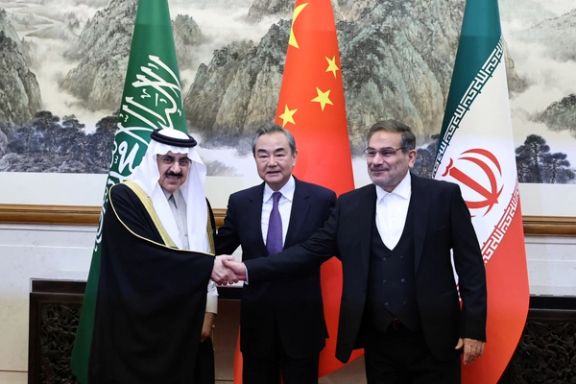
China, Russia and Iran have started maritime drills in the Gulf of Oman, less than a week after Tehran and Riyadh agreed to restore ties with Chinese mediation.
China’s defense ministry announced Wednesday that the drills will last from March 15-19 and “deepen practical cooperation among the navies of participating countries.”
Although it is not the first time the three countries hold joint naval drills in the Gulf of Oman and the Indian Ocean, the announcement coming on the heals of the Saudi-Iranian rapprochement might be a signal by Beijing about its intentions to expand influence in the region.
The drills also coincide with reports that China intends to hold a summit of Arab countries and Iran later this year. The Wall Street Journal quoted diplomatic sources that when Chinese President Xi Jinping visited Saudi Arabia for a regional summit with Persian Gulf Arab states in December, he proposed a high-level gathering of the Gulf Cooperation Council members and Iran in Beijing in 2023.
Most analysts agree that restoration of diplomatic ties between Iran and Saudi Arabia does not mean an overnight resolution to serious differences in their complicated relations. US officials have been quoted as being skeptical about Tehran delivering on what it has promised Riyadh, which is probably pursuing limited goals of reducing tensions rather than forging close relations with Tehran.
But most interestingly, Reuters briefly quoted the Saudi finance minister Wednesday as saying that there are a lot of opportunities for investments in Iran and he does not see an impediment as long as terms of agreements are respected by Tehran.
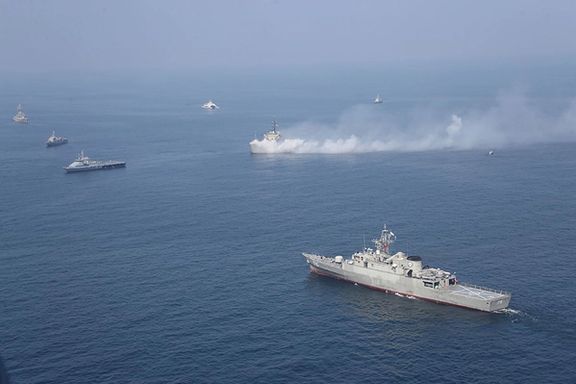
This is going much farther than a cordial resumption of diplomatic ties, and it would mean that the Saudis are willing to throw a lifeline to the beleaguered clerical rulers in Tehran who face a bankrupted economy.
Any Saudi economic dealing with Iran would also directly undercut US sanctions imposed to pressure Tehran, if not violating them outright. But dangling the prospect of foreign investment that Iran has no chance of securing in the current situation, might be a powerful tool.
There have been speculations that Beijing might try to solve the issue of Iran’s nuclear program that has extremely worried the Saudis, and eluded the Americans. In such a scenario, when tens of billion of dollars in Iranian assets are blocked worldwide, the prospect of Saudi investments could be a powerful lever to cajole Tehran to agree to a Chinese brokered agreement limiting its nuclear program.
Nevertheless, at this juncture, a regional rapprochement seems to be moving ahead fast. Nour News, a website in Tehran close to the national security council reported Wednesday that Iran's Supreme National Security Council secretary Ali Shamkhani will visit the United Arab Emirates on Thursday.
"Shamkhani will travel to Abu Dhabi on Thursday in response to an official invitation by his Emirati counterpart Sheikh Tahnoun bin Zayed Al Nahyan to discuss bilateral, regional, and international issues," Nour News said.
"Top economic, banking and security officials will accompany the Supreme National Security Council secretary to the UAE," it added.
Improvement of not only diplomatic but economic relations between GCC members and Iran could be a signal that plans to expand and strengthen the Abraham Accords between Israel, the United States and Arab countries will take the back seat.
This would also be a serious blow to US ‘maximum pressure’ strategy against Iran to push it toward a nuclear agreement that would perhaps include other provisions to limit Iran’s damaging activities in the region. If Saudis can tame Tehran with their own methods, the US role will be diminished as a security guarantor for the Kingdom.

Abolqasem Delfi, a former Iranian ambassador to France, says the deal to restore ties with Saudi Arabia marks the return of Iran's foreign policy to rationality.
However, Delfi pointed out in an interview with Rouydad24 news website in Tehran on Monday, that the agreement with Riyadh to restore diplomatic ties cannot substitute Iran's nuclear agreement with world powers (JCPOA). But he added that the agreement may signal other upcoming breakthroughs in Iran's foreign relations.
Meanwhile, Iranian diplomat Kourosh Ahmadi said in an interview with Etemad Online that Europe and the United States probably welcome the breakthrough because it makes it less likely for Iran to disrupt the flow of oil from the Persian Gulf in case of an Israeli attack on its nuclear installations.
He added that the agreement between Tehran and Riyadh will lead to a reduction in urgency for the US to supply arms to Persian Gulf Arab states as they would be now less concerned about possible threats from Iran.
In another development, Iranian official news agency IRNA quoted former US official and a current senior director at Rafik Hariri Center and Middle East Programs at the Atlantic Council William Wechsler as saying that it will be no surprise if the next news about Iran turns out to be the revival of the nuclear agreement (JCPOA) based on a deal brokered with China.
In yet another development Monday, the IRGC's Javan newspaper in Tehran wrote: "The agreement with Saudi Arabia might pave the way for resolving the deadlock over the revival of the Joint Comprehensive Plan of Action (JCPOA)."
Javan argued that the agreement with Riyadh to some extent meets the US demand about considering the interests of Washington's Arab allies in a deal with Tehran. Javan claimed the Saudi agreement came at a time when efforts have been redoubled to return the United States to the negotiating table with Iran.
Despite Javan's optimism, the Biden administration continues to insist that restoring the JCPOA is no longer a priority. It should be noted that Iranian media increasingly reflect a sense of frustration on the part of hardliners who now seem eager to resume talks with Washington.
The daily further opined that the deal with Saudi Arabi will reassure the United States that Iran will not destabilize the Persian Gulf region. The article in Javan went as far as saying that Riyadh may also encourage the West to make an agreement with Iran.
Centrist daily Ham Mihan was so upbeat about the agreement with Riyadh that suggested now that Iran has come to terms with Saudi Arabia, perhaps it is also time for Tehran to take constructive decisions about the JCPOA, joining the FATF and changing its positions about Russia's war in Ukraine.
Ham Mihan wrote that this will also help solve Iran's domestic problems as without tackling international problems, it would be difficult to address the economic crisis and social problems in Iran.
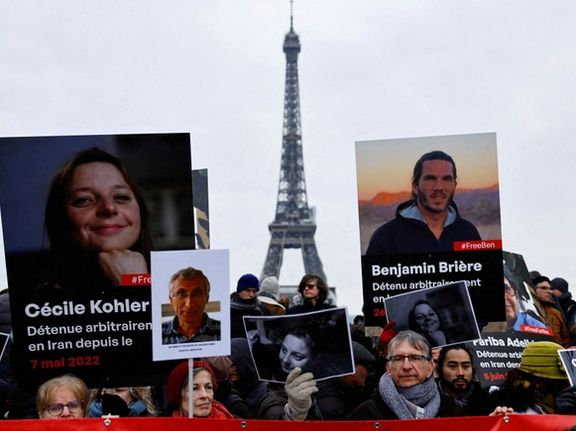
France accused Iran Tuesday of breaking an international treaty defining consular relations and said Tehran had demonstrated publicly that it was holding foreign nationals arbitrarily.
Relations between France and Iran have deteriorated in recent months with Tehran detaining seven French nationals in what Paris has said is state hostage taking.
One of those, Iranian-French academic Fariba Adelkhah, was released, but it is still unclear how much longer she will have to stay in Iran before returning to France.
Speaking to reporters on Monday, Iran's foreign ministry spokesman said the French government had interfered and taken "destructive" positions regarding events in Iran.
"Obviously, these positions and the measures taken by France will not help in the negotiations for the prisoners," Nasser Kanaani told reporters.
French foreign ministry spokesperson Anne-Claire Legendre said Kanaani's remarks were extremely worrying and openly highlighted the "arbitrary character" of the detention of French citizens.
"This is an acknowledgement from the Iranian authorities that they are in breach of the Vienna convention on consular relations which constitutes the foundation of diplomatic relations between states," she said, calling for the French citizens to be released immediately.
In recent years, Iran's elite Revolutionary Guards have arrested dozens of dual nationals and foreigners, mostly on charges related to espionage and security.
Rights groups have accused Iran of trying to extract concessions from other countries through such arrests. Iran, which does not recognize dual nationality, denies taking prisoners to gain diplomatic leverage.
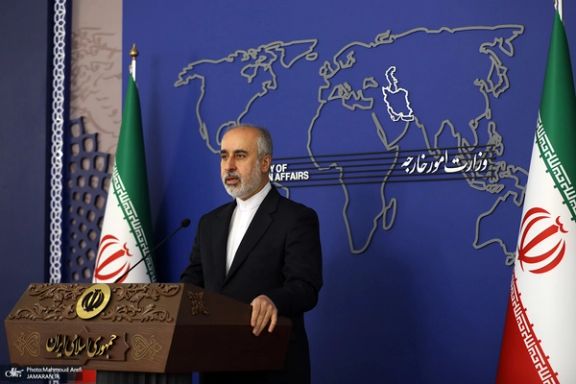
Officials from Iran and Bahrain say the two sides are ready to resume bilateral relations after seven years, following an agreement by Tehran to restore ties with Saudi Arabia.
Mamdouh Saleh, a member of the parliament of Bahrain, told the Arabic service of Sputnik on Monday that negotiations between his country and Iran to renew relations are in process.
Iran’s Foreign Ministry Spokesman Nasser Kanaani also said Monday that Tehran is ready to improve ties with the Arab state again.
Meanwhile, Ahmed Al Musallam, Speaker of the Bahraini Parliament, held a meeting with a delegation from the Iranian Parliament in Manama.
The Iranian parliamentary delegation, headed by Mojtaba Rezakhah is in Bahrain to attend the International Inter-Parliamentary Union Assembly. This is the first time in seven years that Bahrain has received a senior delegation from the Islamic Republic of Iran.
Manama severed its relations with Tehran one day after Saudi Arabia cut ties with the Islamic Republic in 2015.
Iran and Saudi Arabia agreed to re-establish diplomatic ties after Chinese-mediated talks in Beijing last week. The two sides agreed to reinstate embassies and missions after seven years of deadlock.
While Saudi Arabia does not have relations with Israel, the Prime Minister and the leaders of the Israeli opposition are at loggerheads over the normalization of Saudi Arabia's ties with Iran, accusing each other of negligence, which led to the improvement of Tehran-Riyadh relations.
Israel’s Yediot Aharonot daily wrote Tuesday that the negotiations between Iran and Bahrain will be an important development after seven years of stalemate.
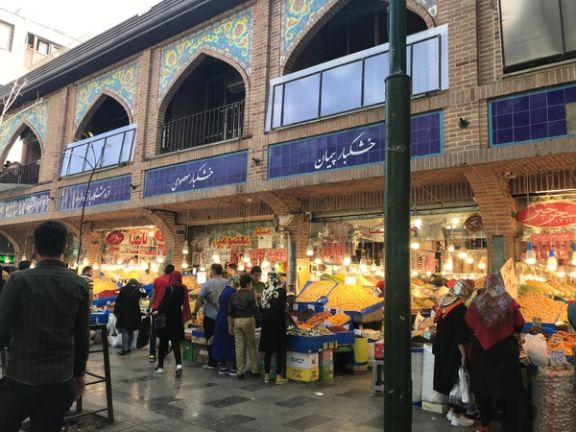
Official figures show there was a sharp increase in food prices in Iran in the past nine months and most items witnessed a more-than 50 price inflation.
The Islamic Republic has been struggling with high inflation since 2019, but the raging inflation in the past Iranian year which ends on March 20, was seriously different from previous years.
Last May the government eliminated an annual food import subsidy of at least $10 billion, that immediately led to steep price increases. This was followed by a fall in the value of the national currency, making imports more expensive for the population.
According to Dideban website, the Raisi administration's refusal to provide cheap dollars for food imports had a serious impact, while the country was already witnessing an annual inflation rate above 40%.
However, the authorities emphasized that part of the galloping inflation was due to the subsidy that was a strain on government subsidies.
The government called its decision to scrap the food subsidy “economic surgery,” but it had no other plans to control prices.
Immediately following the announcement food prices jumped, with some items doubling or tripling in a matter of hours. Pasta is 137 percent more expensive than 12 months ago, while meat prices went up by 76 percent and milk by 80 percent.
Food prices continue to climb as the national currency declined by 50 percent in the past six months. According to the report of Statistical Center of Iran (SCI), in some months, the food and beverages inflation hit 87%.